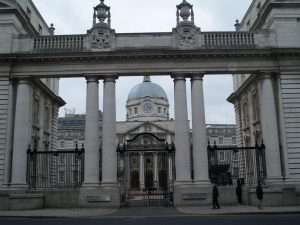A few days before the general election and support for the government parties seems to be visibly crumbling (actually, given opinion poll margins of error of three per cent, the support could have remained virtually unchanged, not only throughout the campaign but throughout recent months). There is a poster of Taoiseach Enda Kenny at the roadside urging us to keep the recovery going, the government’s problem is that for many people there is no sense of a recovery having even started.
Objectively, of course, we are all wealthy, the incomes and the resources available to even the poorest are infinitely greater than those accessible to an overwhelming majority of the world’s population, but wealth and poverty are as much about perception and relative differences as they are about statistics, and the perception is that after seven years of austerity measures, little has changed, that we are still much poorer now than we were a decade ago. Feeling poorer, people feel disinclined to vote for parties who broke the promises made five years ago.
Politicians rarely admit responsibility for the problems they cause, but the likely loss by Fine Gael of one-third of its Dail seats comes a voters’ response to policies that have borne down most heavily upon low and middle income earners. We were told that the financial speculators would not be recompensed for having lost their money in reckless investments, but the government performed a complete volte-face, using public money to cover the cost of private debt. We were told that work would be rewarded, but the government’s reductions in the universal social charge and changes in tax bands gave most to those who earned most. We were told that education was important, but the government continued to raise the third-level fees and set its face against any loan scheme, even if loans are the only way there is for poorer students to access university and college education. There was talk of fairness against a background of flat rate charges like the water charges and the property tax, charges that are a far greater burden for poorer people than they are for the wealthy.
Of course, the government will not admit that it was responsible for its own downfall, will not acknowledge that things could have been done differently. The perceptions could have been different, even modest adjustments might have taken pressure off working people. Had the government noted Charles Dickens’ novel David Copperfield, they might have learned much from the words of Wilkins Micawber, “Annual income twenty pounds, annual expenditure nineteen pounds nineteen and six, result happiness. Annual income twenty pounds, annual expenditure twenty pounds nought and six, result misery.”
A shilling’s difference in Micawber’s accounts would have brought a different outcome. Small generosity of spirit on the part of the government might have put more in the pockets of the majority of voters and there might have been happiness – and a sense that there really was a recovery.
